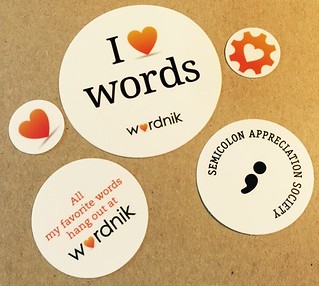First of all, thank you thank you thank you! Because of you, our wonderful backers, we’ve met our Kickstarter goal — and ahead of schedule!
A big reason we met our goal was because of our wonderful word adopters. We’ve seen such a variety of terms taken into loving homes that we became curious as to why people chose the words they did. For instance, our fearless founder, Erin McKean, adopted erinaceous “because it seemed mean to call something [her] favorite word and then NOT adopt it.” So we asked! And the reasons folks gave were as varied as the words themselves.
Some words aligned with adopters’ personal philosophies. Susan Gallant adopted ataraxia because the word “perfectly expresses the relaxation response during meditation — that wonderful feeling of serenity and perfect calm.”
The great word compersion, “the feeling of joy associated with seeing a loved one love another; contrasted with jealousy,” was chosen by Winnie Lim because the word “serves as a constant reminder of the person [she is] and [wants] to be.”
Adrienne McPhaul selected resistant instead of making a New Year’s resolution. “It is a word I felt like described the root of many obstacles in my life,” Adrienne told us, “and I wanted to own it and explore it.” Speaking of exploring, Algot Runeman opted for this adventurous word because, as he said, “What could be better use of one’s time?” We agree.
A couple scooped up words they had coined, such as lovematism, the “passionate magnetic bond of lovers connecting the body, heart, mind, and soul,” by Sherrie Rose, and impert for Bill Solberg, who created the term to “describe a person who makes valuable contributions in a field of knowledge despite lacking formal training or professional connections in that field.” Moreover, “the impert’s contributions typically diverge from conventional styles, thinking, or theories.”
A few folks elected for terms that represented their online brands or identities. Felix Jung wanted blog since he’s been running his own blog with nearly daily updates (admirable!) since June 2002. Karen Conlin honored her awesomely named blog, GRAMMARGEDDON!, by going with armageddon.
Sarah Allen, who goes by the Twitter handle @ultrasaurus, snagged, natch, ultrasaurus, which, in case you were wondering, is a really big dinosaur. Meanwhile, Merchbar optimized SEO by adopting band merch.
Some adoptions reflected adopters’ professions or interests. Trademark was taken by Alexandra Roberts, a “professor who teaches trademark law and researches and writes about trademark issues.” Rachel Houghton, a photographer, snapped up photographer, while Rob Root, a member of the National Numeracy Network and a reviewer for the journal Numeracy, nabbed, not surprisingly, numeracy.
Metaphor is Dr. Mardy Grothe’s “all-time favorite figure of speech,” while John Kelly fed his word origins obsession with etymology. Lenore Edman hooked up robotics since she sells robotic kits, builds art robots, and is a mentor for a high school robotics team. “I liked the idea of adopting the entire field of robotics,” Lenore told us.
Some honored an important person in their lives. Richard Wills decided on dodecaphonic to recognize Austrian composer Arnold Schoenberg “and his two most prominent students Alban Berg and Anton Webern.” Seventeen was selected by Rosie Perera, who told us she was “inspired to love the number 17 by [recently retired] Professor David Kelly who ran the Hampshire College Summer Studies in Mathematics.”
John Dove lassoed unicorn in honor of his father, Dr. W. Franklin Dove, who in the 1930s created “a unicorn bull to see if the psychology of that animal would be significantly different and of value to herdsmen.” Dr. Dove “offered the hypothesis that the single horned animal would be a natural leader of the herd,” and “pointed out that the Dinka tribe in Southern Sudan have traditionally manipulated the horns of selected members of their herds in order to create such unicorns.” He also “suggested that this might have been an origin of the myths regarding unicorns.” Fascinating!
Some words were chosen out of sheer fun. Lightwood Games partied with party because it made them smile (and also because of their game, Word Party). Kelli Krieger jumped at jocular, “a happy word to ward off the darkness in the world.”
Nick Seaman opted for archipelago just because “it’s a fun word,” while Filip Salomonsson got recombobulated since he has “always seen [recombobulate] as a great example of how there is a lot of playfulness in how language works and how words are formed.” Non Wels plucked poppycock because it exemplifies the absurdity and wonder of both life and words. “It also reminds me of something my grandparents would say,” he said. “Which just makes me happy.”
Joan Hall likes the “mouthfeel” of bobbasheely (and also had fun discovering its etymology for DARE), while Karen Mulholland enjoys the “onomatopoeic nastiness” of besmirch. But, she told us, “This judgmental little word won my heart in the usual way – by making me laugh,” reminding her of a tweet that said, “Whenever someone responds to a statement by saying ‘Word,’ I want to yell some random word like ‘BESMIRCH!’” (Karen also assures us that her word “gets excellent care and regular exercise.”)
Then there are the “because I’m 12” words. John picked butts (ahem) because he “was amused by the idea of using [his] very adult paycheck to ‘buy’ the most childish word in the dictionary,” and Rachel White got boners because, as she revealed, “boners are hilarious.”
Finally, we wanted to give an appreciative shout-out to a few of our “forever” adopters: design guru John Maeda who took in design; Craigslist founder Craig Newmark who claimed nerd; editor Jan Freeman who embraced idiolect; and Roger McNamee who tamed wombat. And we’re looking forward to revealing the words Duck Duck Go and MailChimp choose once our campaign is over!
Want to adopt a word but can’t decide on which? We’ll include helpful suggestions for all our Kickstarter backers!
